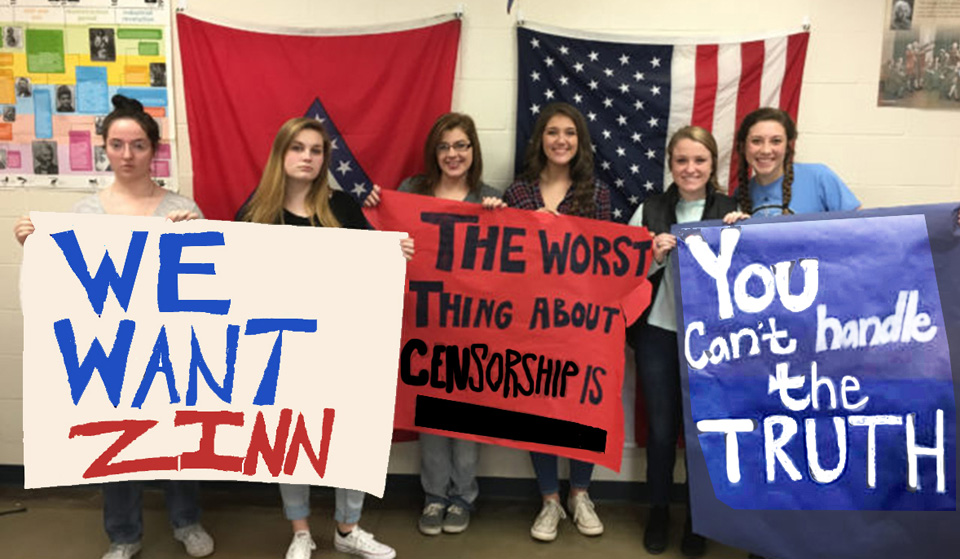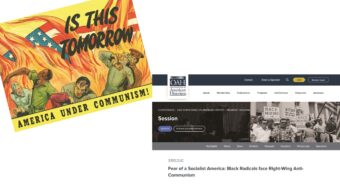
State legislators in Arkansas are trying to pass a law banning books by Howard Zinn from use in public schools.
The move is backfiring.
In recent weeks, over 700 middle and high school teachers and school librarians have requested books by Zinn and according to the Zinn Education Project, more orders are pouring in every day. The Project is filling these orders for free, and is asking for donations to continue to do so.
The proposed legislation, introduced by State Representative Kim Hendren (R) is very broad. It states:
“A public school district or an open-enrollment public charter school shall not include in its curriculum or course materials for a class or program of study any book or other material: (1) Authored by Howard Zinn from the years 1959 through 2010;and (2) Concerning the books or other materials under subdivision (1) of this section.”
In other words, says Melville House publishers, “[The bill] would force Arkansas educators to pretend that Howard Zinn had never written a single book, and furthermore (and this is the really crazy part) would require that they systematically ignore any secondary texts addressing Zinn’s scholarship. By the logic of the law as written, even materials critical of Zinn’s approach to American history, of which there are many, may be prohibited.
“Teachers must simply pretend that one of the most influential and most discussed historians of the twentieth century never existed.”
Representative Hendren, who introduced the censorship bill is known as a bigot. In May, 2009, he made anti-Semitic remarks at a Republican Party meeting. He later apologized, saying “I ought not to have referred to [U.S. Senator Chuck Schumer as being Jewish] … it wasn’t because I don’t like Jewish people. I shouldn’t have gotten into this Jewish business because it distracts from the issue…
“I believe in traditional values, like we used to see on The Andy Griffith Show.”
On the other hand, Dr. Howard Zinn (1922 – 2010) was “proudly, unabashedly radical,” The New York Times wrote in Zinn’s obituary.
“Few historians succeeded in passing so completely through the academic membrane into popular culture,” the obituary continued. “He gained admiring mention in the movie Good Will Hunting; Matt Damon appeared in a History Channel documentary about him; and Bruce Springsteen said the starkest of his many albums, Nebraska, drew inspiration in part from Mr. Zinn’s writings.”
Zinn was the author of dozens of books. His La Guardia in Congress (1959) won the American Historical Association’s Albert J. Beveridge Award. He received many other awards also, including the Lannan Foundation Literary Award for Nonfiction, the Ridenhour Courage Prize, and the Eugene V. Debs award for his writing and political activism.
Zinn’s best known work is A People’s History of the United States, a best seller “that inspired a generation of high school and college students to rethink American history,” according to the Times.
“[Zinn] concentrated on what he saw as the genocidal depredations of Christopher Columbus, the blood lust of Theodore Roosevelt and the racial failings of Abraham Lincoln. He also shined an insistent light on the revolutionary struggles of impoverished farmers, feminists, laborers and resisters of slavery and war.”
He was criticized for being “biased.”
“That criticism barely raised a hair on Mr. Zinn’s neck,” the Times obituary said. “‘It’s not an unbiased account; so what?’ he said … ‘If you look at history from the perspective of the slaughtered and mutilated, it’s a different story.’”
Representative Hendren’s bill is not the first attempt to ban books by Howard Zinn in public schools. In 2010, Governor Mitch Daniels tried a similar move in Indiana. In 2011, A People’s History was removed from schools in Tucson, Arizona, as part of the ban on Mexican American Studies.
In Arkansas, a firestorm of protest erupted among educators and librarians when Hendren’s book banning bill became public. The Zinn Education Project was inundated with book requests.
For example, a middle school librarian from Western Grove wrote, “To combat ignorance, I must have knowledge. I respectfully request a copy so I can educate my tiny corner of the world.”
And a Little Rock middle school social studies teacher wrote “We must stand against censorship in Arkansas’ classrooms. Our students are bright and appreciate being challenged. They want to be exposed to all points of view, not shielded from those others find abhorrent.
What’s more, high school students in Batesville, Arkansas, wrote to their state senator and tweeted their protest.
The Zinn Education Project website says, ”In solidarity with Arkansas educators and students, we will send a book by Howard Zinn and A People’s History for the Classroom to any Arkansas teacher who requests them. This offer is made possible by donations from individuals and publishers … .
“Stand with [us] to defend the right of teachers in Arkansas and everywhere to use materials by and about Howard Zinn. Join us with your donation.”












Comments